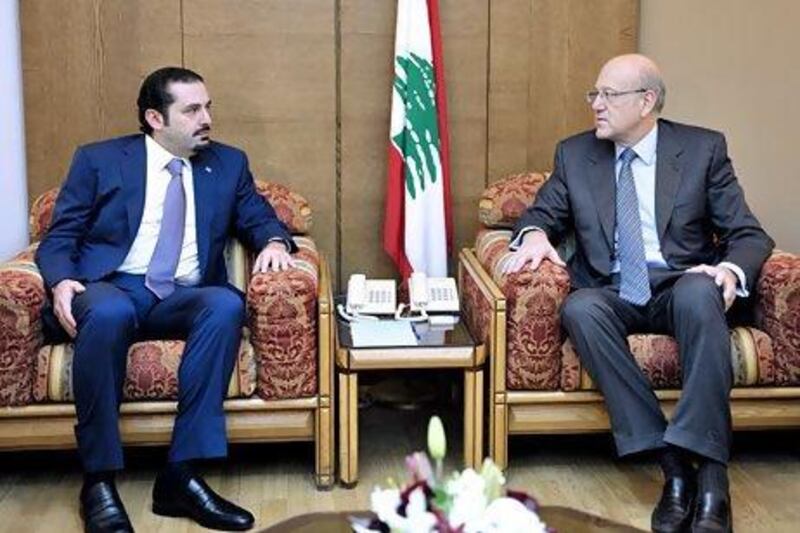Lebanon is a tale of two billionaires: the prime minister Najib Mikati and his predecessor, Saad Hariri.
Mr Mikati, 55, amassed his US$3 billion (Dh11.01bn) fortune from mobile telecoms in Africa, after selling his stake in Investcom to South Africa's MTNin June. He heads up a government that came to power in January last year, using Hizbollah's veiled threat of violence to force its way into the government palace, Grand Serail.
However, he has confounded those who initially labelled him a stooge by holding the country together, especially while Syria, whose interests the government was formed to protect, fell apart.
Mr Hariri, 42, is reputed to be worth $1.7bn and runs the family owned Saudi Oger.
The son of the slain former prime minister Rafik Hariri and the man Mr Mikati's more unsavoury colleagues helped to unseat, Mr Hariri is supposedly on the side of angels.
He was propelled from obscurity following his father's murder and now heads the Future Movement, part of the March 14 coalition that forced out Syrian hegemony and promised to unlock Lebanon's undoubted potential.
The Saudi-born Mr Hariri reportedly feels betrayed by his co-religionist (both are Sunnis, the sect that is the backbone of the nation's merchant class and the one from which the Lebanese choose their prime minister), but in the past 18 months he has done woefully little and has been shamefully absent in his role as head of the opposition.
A much-tweeted skiing accident in France in January only served to highlight his playboy image, while his extended residence in Saudi Arabia has merely stoked rumours that he is, and always was, Riyadh's man.
Last Sunday, at a Future Movement rally in Tripoli, those present were assured of Mr Hariri's "salutations, love and loyalty" but it was a hollow gesture. Mr Hariri's credibility among the wider Lebanese population is at an all-time low and a far cry from when he was at the fore of the 2005 Cedar Revolution.
Mr Mikati had it all to do. After the bloodless coup of January 2011, many saw him as an opportunist, a man with a chance to cement his name in Lebanese Sunni politics, while others reminded us of his close ties to Syria's Al Assad family.
His government did what Lebanese all expected it to do and has failed spectacularly, but while there have been multiple calls for its resignation, even its fiercest critics concede that Mr Mikati may be invited to head up a new administration, should the cabinet fold.
Not only has he been showing up to work, but he fended off pressure from both Syria and within his own cabinet to kill off the international tribunal for Lebanon, the international court created to bring Rafik Hariri's killers to justice. The prime minister has also spoken out against Syrian border violations.
He understands Lebanon's priorities. Last week, at the inauguration of the second Lebanon Economic Forum, Mr Mikati admitted that, while he had high hopes for the potential of his country's apparently substantial undersea oil and gas deposits, the nation still faced enormous challenges in "administrative and economic reforms as well as developing and rehabilitating the infrastructure".
This was supposed to be Mr Hariri's script, but the man who has resorted to Twitter to reach out to his followers has gone off message. His party is now embroiled in allegations that it is arming Syrian rebels.
Meanwhile, Mr Mikati still has to convince many Lebanese that he has no time for the more unsavoury elements in his cabinet.
Everything still to play for.
Michael Karam is a freelance writer based in Beirut.





